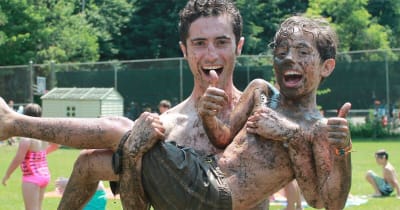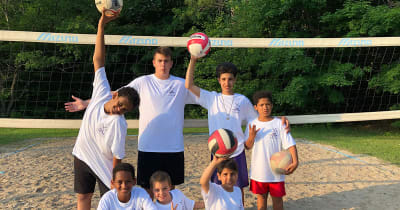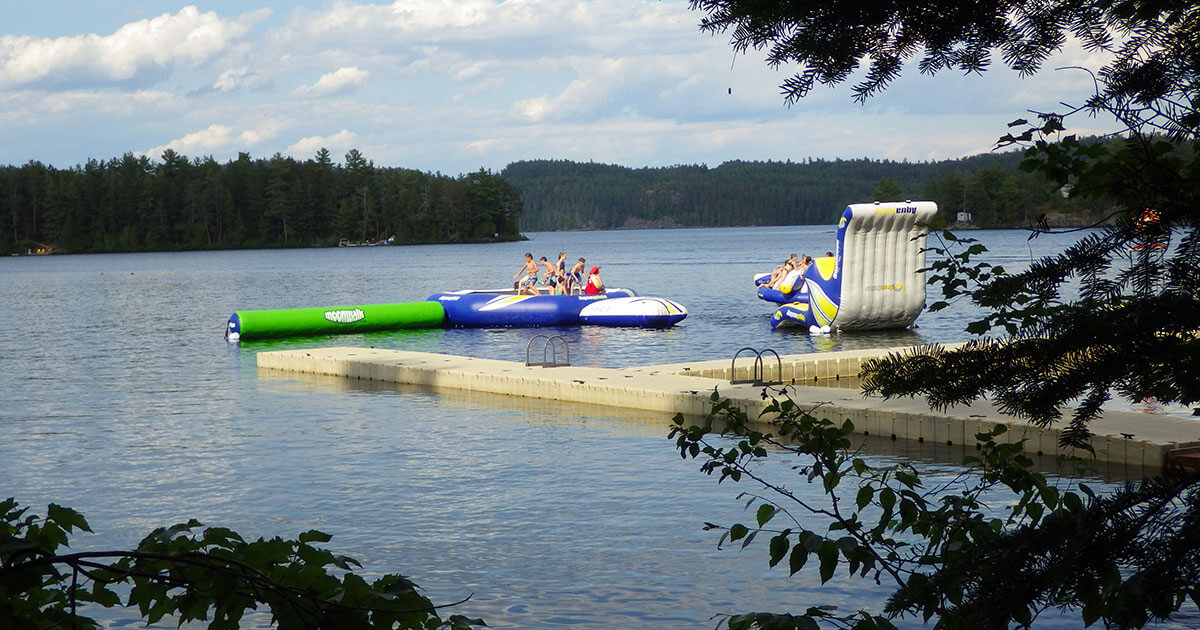It’s a marathon, not a sprint
Today, we’d call that “grit,” a concept that has been gaining traction particularly through the work of Angela Lee- Duckworth, a lecturer in psychology at the University of Pennsylvania. She studies the intangible aspects of success: self-moderation, passion and perseverance, and a healthy approach to disappointment.

Camp Ouareau
“Grit is having stamina,” says Lee-Duckworth. “Grit is living life like it’s a marathon, not a sprint,” while acknowledging your abilities as well as your weaknesses. Her book, Grit: The Power and Passion of Perseverance, begins with a discussion of students who drop out of West Point, and that “rising to the occasion had almost nothing to do with talent.” The determinant is less ability than it is a “hang-in-there posture toward challenge.” Grit is what, ultimately, will help kids accept setbacks and weather the difficulties they’ll encounter as they grow into adulthood and beyond.
And with Palm and so many others, it’s also proven to be something that camps are uniquely able to provide. Yes, there is skill development, though typically skills aren’t promoted for themselves alone, and with more important goals in mind. “It’s great that you become, say, a skilled rock climber,” says Steve Archibald, director of Medeba Summer Camp, “but hopefully in the process of learning skills we’re extracting some things that develop our character, our leadership competencies. And they become things that are very transferrable … into our workplace, family, or community of friends. We start to see skills and ways of thinking that are very transferrable.”
Prime among them is a sense of who we are, and how we can develop our strengths and bring them to bear in positive ways. Says Palm, “Nowhere else are you given so much responsibility at a young age, held accountable, given an opportunity to make mistakes and fix them, and be supported through all that.” It can be a transformative experience. Of her own campers, Palm says that “when I ask them ‘What did you learn at camp?’, the thing I most often get is: ‘What I learned about myself.’”

Zodiac Swim and Specialty Camp
Be prepared
“These are really just foundational skills,” says Kate Cassidy, director of Brock Youth University, a program based in St. Catharines, Ontario. “Developing these skills doesn’t start at 18; it starts when they’re much younger.” They are nevertheless what employers will be looking for when the campers have grown, left camp, and begin their careers. “You can really tell in a work environment who has been to camp and who hasn’t,” says Lisa Wilson, long-time director of Camp Oconto. She chuckles as she says that, perhaps out of modest pride for helping girls over her decades as a camp professional, to achieve that difference, that character.
Wilson first attended Camp Oconto at just three months of age. Her parents ran the camp and then, after them, she ran it, and has done now for 36 years. When it comes to camping, much like Palm, she’s a lifer. She loves it, not for the office work of course—there’s lots of that, which is handled out of the Unionville office whenever they aren’t at camp—but for what camp can do in the life of a child. “I get wonderful thank-you notes and emails from different people,” she says, turning to one that she recently got from a parent in the UK. It’s about a camper who arrived many years from there, and it says many of the things that these kinds of letters typically do. How camp was so important to her, and to her family. How important the memories continue to be, despite how little of each year, when you really think about it, she was actually at camp. The letter writer describes how camp encouraged her daughter to grow and develop into the person she is today.
Maya came back from her first year at camp and... there was something so profound about the change that had happened in her... and it was partly about being more independent and more autonomous, but it was also just some sort of self-confidence … ”
–Liz Warwick, parent, Camp Ouareau
“It makes me realize how important it is to be a positive role model,” says Wilson. “That’s what keeps me going. It can be challenging, but the positive impact is huge.” What that thank-you note conspicuously lacks, as many do, is any mention of specific skill development, at least in the way we typically think of it. The take home, at the end of the summer and in the years to come, often isn’t what they did at camp, but who camp helped them to become. “So many things at camp just come through by osmosis,” says Wilson. “We’re not teaching them; they’re learning by doing.” As she speaks, she wonders if the point might be even finer than that: you’re not just learning by doing, you’re also learning by simply being there. “All the wonderful activities are great, but they’re very much a vehicle for learning some of the more important things,” including self-awareness, communication skills, problem-solving, and perseverance.
Accept support …
One of the reasons that camp is so successful with young people, Wilson feels, is that there is a more realistic interface between kids and the world around them. “People on social media, they take pictures on sunny days when they’re doing fun things and it gives them unrealistic expectations of what life should be.” At camp, for example, it rains. “In the city, if it’s a rainy day, and gross, and cold, chances are you might just sit inside all day if you can get away with it. Whereas at camp you have to get out. If it’s raining, we still go out. We walk to the dining hall, or to activities, and we dance in the rain. … It may not be an enjoyment thing, it may just be something you need to get through.”

Ways of the Woods Day Camp
Another reason is because any hardships aren’t skirted, but faced head on, together. Oconto is a girls’ camp, though Wilson is careful to contextualize the benefits of a single-gender environment. “There’s girl power, there’s boy power,” she says with what feels like a sigh, “but I think we need to be careful because all youth need support.” There’s a sigh there, too, in acknowledgment that that term, “support,” can be a tricky one. For her, it isn’t synonymous with a personal cheering squad, but rather with a context in which kids can learn to accept both their successes and their failures. “To say to them that nobody is ever going to win is ridiculous,” she says, noting that competition is part of life. But it’s a fine line, of course, in presenting positive forms of competition, healthy attitudes, and appropriate rewards. At Oconto, there are a couple of trophies, though Wilson tries to keep things simpler. Success is most typically acknowledged through a pat on the back, a high-five, or a round of applause in the dining hall. “The warmth they get from that is far bigger than what they get from a trophy.”
There is the brotherhood factor—we see boys really trying to live up to the positive qualities of the older staff and older alumni.”
— Mike Sladden, Camp Pathfinder
… but carry your own pack
A story Wilson likes to tell comes from when she was at a coed tripping camp. “I walked along the portage path and there was a girl waiting there, and I asked her what she was doing. She said she was waiting for her boyfriend, because he would carry her pack.”
For Wilson, that wasn’t on. There was an ensuing conversation, the upshot being that “you don’t need somebody else to carry your pack.” While not a panacea, Wilson feels that one of the benefits of girls’ camps is that they start from that point. “The fact is that at a girls’ camp there wouldn’t be a boy to say ‘well I’m going to let him do my tough work.’”
For many kids, camp is the only place they not only have an opportunity to really be responsible for carrying their own pack, but are required to, and that’s true across the various types of camp offerings. “It’s not a cruise,” says Christy Griffin of Bytown Brigantine. They sail tall ships with fully licensed youth crew on Lake Ontario, the St. Lawrence, and the Atlantic Ocean.
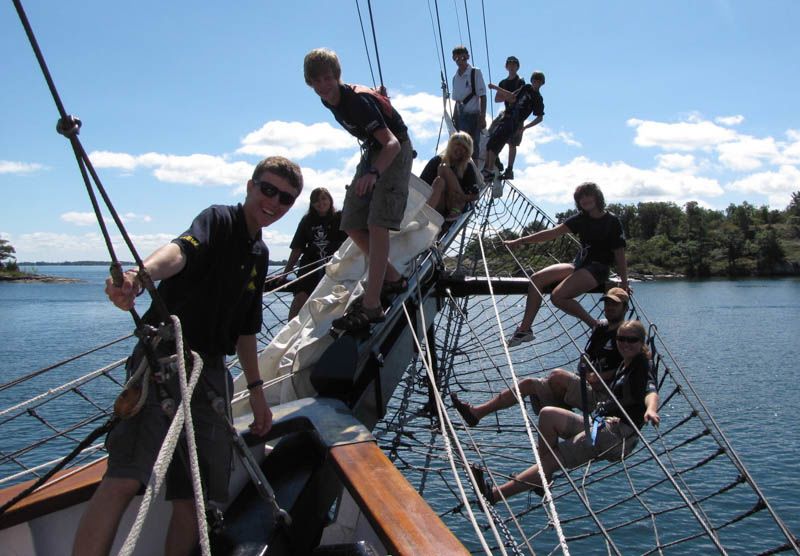
Bytown Brigantine
“You’re stepping aboard as a crew member,” says Griffin. “It’s fairly rustic. There are no curling irons and no hair dryers. If you want a shower, it’s usually in the lake.” There are lots of things to do, and everyone does them. At the same time, kids learn about weather patterns, do chart work, even prep food in the galley. “It’s very much a hands-on experience.” It also isn’t for the faint of heart. Griffin recalls that one year there was a girl who was terrified of heights, and resistant to getting up into the rigging. Even so, the boat is its own world, with everyone leading by example, and within a few days, she was up there, too, getting the job done and loving it. They all do, even without their phones (devices are only available to the kids while they are in port).
One session sails from Saint John, New Brunswick to New York City, and takes in the sights and culture along the way. “They will be sailing Long Island Sound, Martha’s Vineyard, and Mystic Seaport. … In Louisburg, it’s crab fest that weekend, and we’ll be participating in a very authentic maritime event.” In port, the kids are the experts, representing the ship, its crew, and interpreting the experience aboard.
Wear good clothes, and do what you need to do
For some—as with the girl who was reluctant to climb into the rigging—the physical challenges of life aboard ship are the most consequential. For others, though, it could be the public speaking, or the need to collaborate with others. It’s a reminder that all kids need to be challenged in order to grow and learn, though they don’t all need to be challenged in the same way.
Marie-Pierre Lacasse is the director of Camp Portneuf in Lac Sept-Îles, Québec. It’s a traditional camp with a twist, in a sense, in that it focuses on supporting kids with behavioural problems. “We had a child that was on the spectrum,” she says. “He was verbal, but has a really hard time interrelating with people. … When his mom showed up at the end of the week, she said that it was the first time he had ever succeeded at something. He had actually stayed his whole week at camp,” this being a child for whom staying a full day at school was a challenge, one that he had rarely met. “That’s the kind of experience that we’re looking for. A life-impacting type of experience, for kids that typically don’t fit in,” says Lacasse. “Who hasn’t been labelled, who hasn’t been set aside? At the end of the week, we want them to have had just a regular experience.”
Yes, you do learn a lot, say, by going to archery—how to use a bow and arrow, and how to be safe. But it’s not just those lessons that you’re at camp for. It’s the life lessons.”
—Nicole Christamtsis, director, Olympia Sports Camp
It doesn’t always present in the same way. Contrasting with life aboard a tall ship, Lacasse says that “if my kids want to follow ants for an hour, great! That’s an awesome activity!” Watching ants is a great activity, in her mind, not because of what kids learn about ants, but the time it gives them to slow down a bit, follow their curiosity, and support the values inherent in the camp experience. “Our campers will become staff,” says Lacasse, “they have to be empowered in their experience if they’re going to transmit the same thing to others.” Certainly, that experience of empowerment, as well as that sense of trust and responsibility, can be transformative. “These are great kids!” says Lacasse, and she lets them see that about themselves. “We want them to be in contact with the world, with each other. When I talk to parents, I talk about how they will develop at camp, not what they’re going to do at camp.
First eat, then sing
There are lots of rules at camp, of course, because there needs to be. Kids need to wear PFDs, and to stop running when the whistle blows. There are some, too, that you might not expect. “At lunch and dinner we have a rule that after everyone has finished a first course, then you’re allowed to sing,” says Lisa Wilson. “The first course rule is because we’d have kids leaving the dining hall without having eaten, just singing and dancing.”
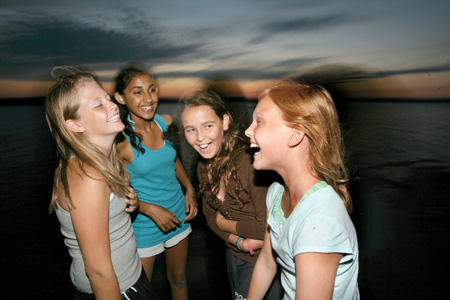
Camp Glen Bernard
It highlights what a different place, a different sense of priorities, can bring out in kids. True, most parents don’t have to enforce a no singing rule. In the general course of events, sadly, kids aren’t given to spontaneous, full-throated singing. They feel their voices aren’t good enough, or are embarrassed for others to hear. But again, camp is different. At Oconto, the girls break out into chants and songs in the dining hall and everywhere else, too. It’s probably because it’s just one of those things that people do at camp, and always have. And everyone does it, so no one is the odd one out. Given that Oconto is a girls’ camp, there isn’t the sense of being watched by boys. It’s a different set of parameters that the campers, for a week or two, are living within.
It might not seem like much, given that most of the campers’ lives are spent elsewhere. But that’s deceptive. For the girls canoeing at Oconto, the kids watching the ants at Portneuf, or the kids in the rigging of a tall ship, they’re learning about who they are, what they’re capable of, and who they might become. They’re learning about the world, the values that they hold, and the opportunities that are available to them. They’re learning to trust themselves, and to trust others. “If you build up skills that are positive,” says Lacasse, “that’s awesome.” She’s right. It is. And they’re skills that they’ll rely on for the rest of their lives.







